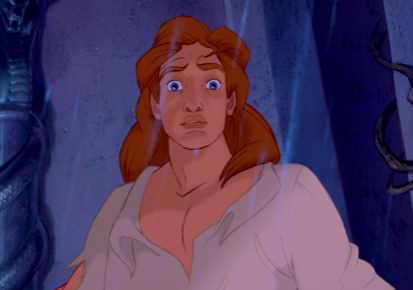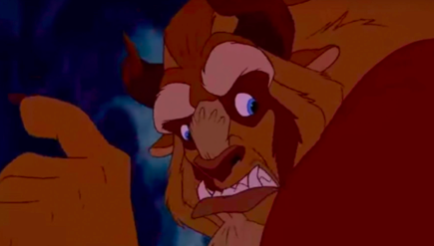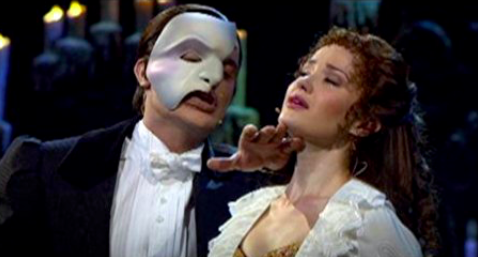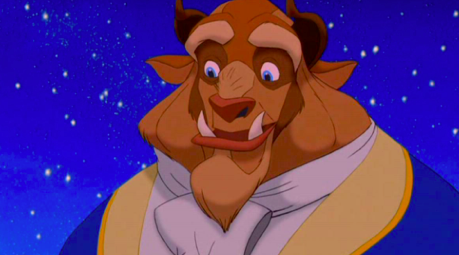“The half-buried truth about Disney’s Beauty and the Beast, writes Jia Tolentino in The New Yorker, “is that, in the end, the prince is a letdown.” Nine-year-old me certainly thought so. When Belle’s whispered “I love you” finally turned the Beast back into a man I was, initially, repulsed. (“His nostrils are too big!” was, I believe, my actual complaint.)

This notion that Prince Adam is actually less attractive than the “hideous beast” is, believe it or not, pretty common. All you have to do is Google “prefer the beast to the prince” and you’ll get a slew of articles written by people admitting that the Beast is . . . well . . . kind of hot.

In fact, this phenomenon is not exclusive to Beauty and the Beast. The trope of women falling in love with monsters has been around for a long time — think The Phantom of the Opera, or any book or movie with a vampire (like Dracula or Twilight) — and we, as the audience, are not repulsed by this. On the contrary, we fall in love with the monster too. (I mean, if given the choice between Raoul or the Phantom, who are you really going to choose?)
But it’s not like we’d actually fall in love with these people (or monsters) if we met them in real life (at least I hope we wouldn’t). So, what’s going on? Why do we love stories where women fall in love with monsters?
Anthony Lane, also writing in The New Yorker, says that “the scent of sex” permeates the 1946 French version of Beauty and the Beast. And he’s right. But it’s not just that version, and it’s not just Beauty and the Beast. Think of Andrew Lloyd Webber’s Phantom seducing the innocent Christine: “Touch me, trust me, savor each sensation.” Or consider that the bestselling Twilight series was written to be a metaphor for the value of abstinence before marriage — Edward’s desperate hunger for Bella’s blood means he is drawn to her but must hold back lest he condemn her to his own dark fate.

Raw masculinity — the rage, the brute force, the bullish independence, and yes, the sex — is what these monsters represent in their various stories. It isn’t really about the way these characters look, it’s about how they behave. They exude a kind of unchecked masculinity that — regardless of what modern feminists want us to believe — women really like.
But, of course, men who behaved in real life the way these monsters do in their stories would not be the kind of men we’d want to associate with — let alone bring home to meet mom and dad. But the stories deal with that too. The moment that Belle begins to fall in love with the Beast is the moment in which he uses that brute force and rage to protect her. Edward’s appeal lies largely in his struggle to keep his monstrous urges at bay for the sake of his love for Bella. When the Phantom murders Piangi we know, in our hearts, that Christine can never be with him, because he’s shown he can’t channel his urges for good. And when he finally feels the force of Christine’s love and realizes his mistake, we love him even more. It’s the way the monsters channel and control their overwhelming urges in response to the love they feel for their partners that really seals the deal for us.

Because these stories are, of course, metaphors. (We’re not all, as some insane feminist critics wants us to believe, into bestiality.) The monstrous forms of these characters represent the way in which they have allowed the raw masculine energy that lives inside of men to consume them. And the interplay between these men and the women they love is the antidote to a life of unchecked urges.
In recognizing something in the man that’s worthy of her love — a desire to protect her, for example — the woman begins to draw out the “gentleman” within the man by giving him a reason to control himself. And, in doing so, the woman finds that the man has become her perfect match — everything she found attractive in the monster, with the self-control and protective instincts of a man.
The creators of Disney’s Beauty and the Beast believed, as they were animating the prince, that viewers wouldn’t like the prince as much as the beast no matter what they did, because they’d grown attached to the character in beast form. But that’s only part of it. The transformation of Beast to Prince is jarring because of what it represents to us symbolically. All that masculine energy that had drawn Belle (and us!) to him in the first place is no longer visible to us on the outside, because — in becoming a man — the prince now symbolically represents his own ability to marshal his urges. And, even though we know that this is the best version of him, we kind of miss the Beast.
Even the 2017 live-action version of Beauty and the Beast — which cast feminist activist Emma Watson as Belle and tried to “update” the princess to make her more “feminist” — acknowledges Belle’s attraction to the Beast. In the final sequence, Belle asks her prince how he’d feel about growing a beard. (He growls playfully in response.) Belle doesn’t want to lose the part of the prince she fell in love with — the ultra masculine Beast who uses his masculinity to protect and care for her. Even this version — which claims to be a “feminist” reboot — acknowledges the masculine appeal of the Beast.

All of this should tell us something about what feminists like to call “toxic masculinity.” The type of raw masculine energy that the monsters represent is not, in and of itself, “toxic.” In fact, the sheer number of articles online about how attractive the Beast (or the Phantom, or Edward Cullen, or Dracula) is — many of them written by people who would call themselves feminists — should tell us that this type of masculinity is actually what women want. Even feminists. Go figure!
I’ve recently (since I got into fairy tales) seen The Beast as Belle’s ticket out of her family obligations, and the movie emphasizes Belle getting out of her crummy little town. As bad as captivity is, she’s captive in an awesome castle with a huge frickin’ library and behind walls where Gaston can’t bother her anymore. Her decision to give up her father is not entirely self-sacrificing. I find this selfish aspect of Belle pretty interesting, especially paired with her attraction to The Beast, in that she seems like a young woman who isn’t all that interested in a relationship until the right Beast shows up (along with his potential to liberate her from her poor provincial town, Gaston, and her obligation to her father).
LikeLiked by 1 person
Sorry but I’m not buying this. Belle gives no indication that she’s after money or luxury and she has no idea there’s a huge library in the castle when she agrees to live there for the rest of her life. Her decision is a selfless one.
LikeLike
Well, to be fair, she was implied to already be rich enough to not even NEED to work and could afford to read all day, not to mention frequent the book store, so she didn’t really need to pursue money or luxury. She did want out from her village, though.
And while I’ll give Belle credit where it’s due and state she did indeed selflessly trade places with her dad regarding prison sentences, at least for the most part, she unfortunately behaved extremely badly during the first night (worse than Beast, even, at least Beast swallowed his pride and actually ATTEMPTED to be polite and civil to her at the servants prodding despite clearly being uncomfortable with doing so, something she couldn’t attempt to do in turn.). And then she breaks into the West Wing, deliberately disobeying not only the Beast, but also the servants who disobeyed their prior orders to not feed Belle earlier when they tried to bar her from any access for reasons that were implied with her “Ah, so THAT’S the West Wing, huh?” to be out of spite against Beast and not mere idle curiosity, and literally called the whole deal off and tried to flee from the castle (and what’s worse, it’s implied that not even a full day passed since she did that prisoner exchange, only managing to do a couple of hours at most, meaning she just proved herself to not even be trustworthy regarding her own word.), and then refused to take any real responsibility for the fact that the resulting mess with the wolves was ultimately her fault, more than Beast’s if I must be honest (Yes, Belle had a point that he should control his temper to the extent that he doesn’t go Kylo Ren on the furniture, but on the other hand, Beast actually had VERY good reason to be angry with her given her very deliberate disobedience earlier, and not out of idle curiosity or even concern for his well being which would have been forgivable, but out of sheer spite), and it’s implied that she still largely hated him the next day with that glare she gave when Beast requested that she close her eyes. If anything, she only started actually LIKING the Beast after her gave her the library, NOT when he saved her life. All in all, she came across as more selfish than selfless even WITH the one genuinely selfless action she DID do regarding trading places with Maurice.
LikeLike
I think I was tipped off to this aspect of the story by Dr. von Franz.
LikeLike